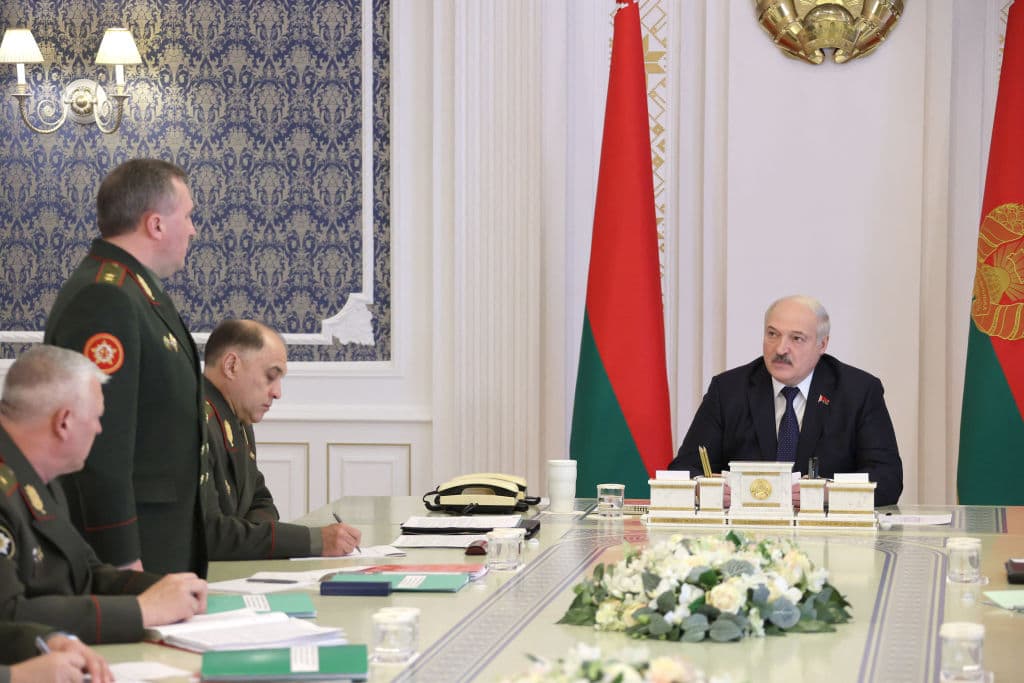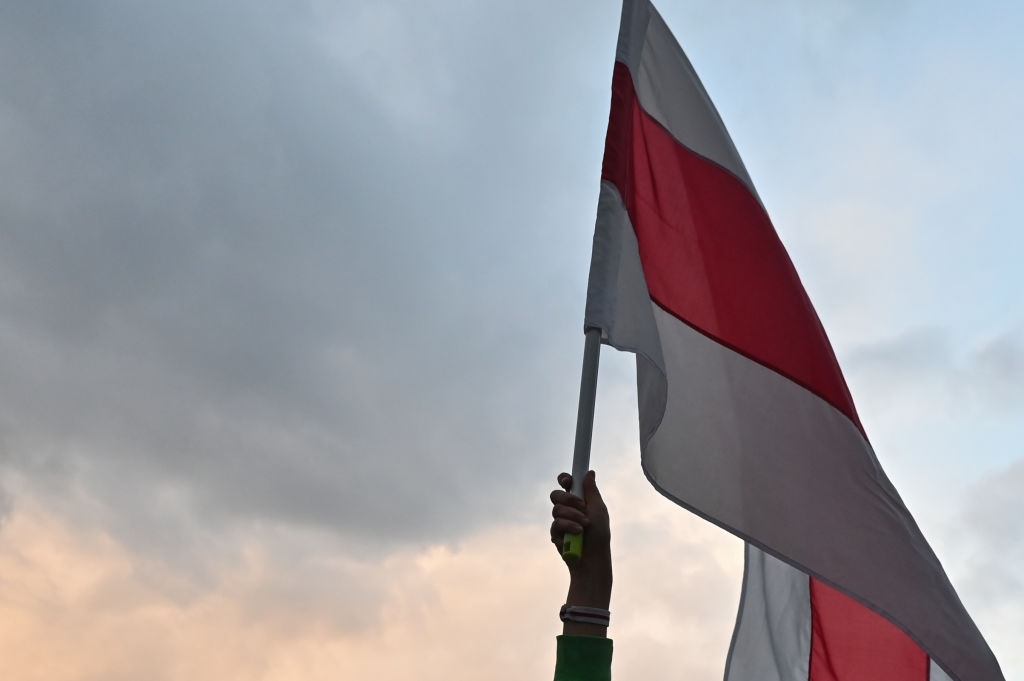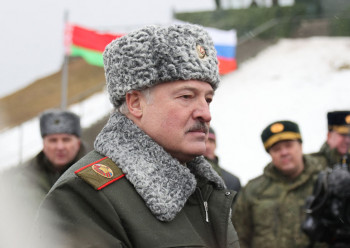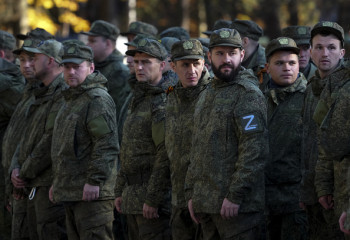Belarus Weekly: Minsk establishes joint command with Moscow, awaits arrival of Russian troops

Belarusian dictator Alexander Lukashenko supported Russia's missile attacks against Ukraine, adding that his country began the process of creating a joint regional military command with Moscow.
Additionally, Lukashenko subordinated the KGB directly to himself, potentially fearing the arrival of a large group of Russian troops, which he welcomed as part of the joint command.
President Volodymyr Zelensky appealed to the G7 with a proposal to establish a peacekeeping mission on the border with Belarus to stop Minsk's accusations of preparing an attack from Ukraine.
Opposition leader Sviatlana Tsikhanouskaya addressed Zelensky with a proposal to build an alliance with democratic Belarus.
Belarus broke two financial agreements with the EU. Meanwhile, a $3 billion loan from Russia and the Eurasian Bank was announced.
In an attempt to curb the increasing inflation, Lukashenko imposed a ban on price increases. Dozens of criminal cases followed.
Managers of the largest independent news agency BelaPAN received from 4 to 14 years in prison for their work.
The famous Red Church in the center of Minsk was nationalized, in a move seen as another attack on the religious community which condemned the state terror against protestors in 2020.
Belarus, Russia establish joint regional military command
Lukashenko gathered top military command on Oct. 10, as Russia was bombing multiple Ukrainian cities.
Lukashenko supported Russia's attacks, adding that his country began the process of creating a joint regional military command with Moscow. He didn't explain what the new military formation would be tasked with.
"We launched this process, maybe a couple of days back," said Lukashenko. He once again accused Ukraine of plotting an attack against Belarus. No evidence had been presented.
Belarus' Security Council Secretary Pavel Muraveyko added that Belarus is taking an active part in Russia's war against Ukraine by "performing some duties."
The command primarily consists of the Belarusian army but receives the support of Russian troops. At the meeting, Lukashenko claimed that "thousands of Russian troops would come to Belarus" and ordered preparations for their arrival.
Russia has used Belarus' territory as a launchpad for its recent bombardment of Ukraine.
ISW suggests that deploying Russian troops in Belarus might serve the purpose of holding the Ukrainian military near Kyiv and away from the east and south amid the ongoing counteroffensive.
According to the Conflict Intelligence Team, the Belarusian army won't change the course of action on the battlefield even if it joins the war directly.
Zelensky calls for peacekeepers at Belarusian-Ukrainian border
On Oct. 11, Zelensky offered to station an international peacekeeping mission at the Belarusian-Ukrainian border in response to the announced deployment of joint regional military command in Belarus.
Ukraine does not plan military actions against Belarus, President Zelensky said during an extraordinary G7 summit led by German Chancellor Olaf Scholz.
"To completely remove this provocation, to remove these narratives by Lukashenko, to remove even the assumption of any alleged threat from us, we offer our solution," said Zelensky.
"A mission of international observers may be stationed on the border of Ukraine and Belarus to monitor the security situation," Zelensky said during a conference gathered as a response to Russia's widespread bombardment of Ukraine on Oct. 10.
On Oct. 8, the Ukrainian Ambassador to Belarus, Ihor Kyzym, was summoned to the Belarusian Foreign Ministry and received a note blaming Ukraine for planning to strike Belarusian territories. No evidence was presented.
The Ukrainian Foreign Ministry refuted the statements.
Tsikhanouskaya offers Zelensky alliance with democratic Belarus
After Lukashenko announced the deployment of the joint Russian-Belarusian military command, the opposition leader of Belarus addressed Zelensky.
Tsikhanouskaya offered Ukraine to establish diplomatic and political relations and to build an alliance with democratic Belarus.
"Belarusians are not Lukashenko; Lukashenko is a disgrace to my country," she said.
Kyiv has been abstaining from any connections with Belarusian opposition. Ukraine hasn't introduced personal sanctions against Lukashenko and still has diplomatic ties with the Belarusian regime.
Belarus sends equipment, ammunition to Russia, stores Iranian drones
The monitoring group Belarusian Hajun said the trains with heavy machinery and ammunition had been heading toward Russia since Oct. 9.
The first batch of 20 T-72A tanks departed for Russia on Oct. 9. Another train with eight T-72A tanks and at least 28 Ural trucks was spotted on Oct. 11.
Belarusian railroad workers' community confirmed the data and leaked the route of the trains to the media.
Ukrainian intelligence reported that 492 metric tons of ammunition from Belarus arrived in Russian-occupied Crimea In October.
Ukraine's General Staff reported that Belarus had sent 250 wagons of ammunition, weighing 10,000 metric tons, to assist Russian troops in Ukraine since Feb. 24.
Ukrainian intelligence also reports the delivery of the Iranian Shahed-136 kamikaze drone to Belarus.
The Ukrainian Defense Ministry's Intelligence Directorate also reports that at least 32 Iranian kamikaze drones Shahed-136 have been brought to Belarus. Eight more are yet to come.
The Belarusian Hajun project hasn't received any evidence of drones in Belarus.
Belarusian KGB becomes exclusively subordinate to Lukashenko
Lukashenko signed a decree on Oct. 10, making the KGB directly subordinate to him.
Belarusian KGB inherits its objectives and methods directly from the Soviet namesake. It is considered responsible for the disappearance of political opponents of Lukashenko, arbitrary arrests, and torture. The organization is directly involved in persecuting Lukashenko's opponents after the fraudulent 2020 presidential elections.

Members of the local Belarusian diaspora hold old Belarusian white-red-white flags as they meet with the exiled leader of Belarus’ opposition, Sviatlana Tsikhanouskaya, in Krakow on Oct. 2, 2022. (Getty Images)
Belarus to receive $3 billion from Russia
On Oct. 6, Russia approved the allocation of $1.5 billion for Belarus to support “import substitution.” On Oct. 5, the Eurasian Development Bank (EDB), which was established by Russia and Kazakhstan, said it would give Belarus $1.5 billion.
Belarusian Prime Minister Raman Halouchenka claimed that import substitution is vital for Belarus’ “technological sovereignty and independence.”
In June, the Belarusian government announced the development of a bill that would allow the import of goods and use of software in Belarus without permission from copyright holders. The measure is said to be a solution against shortages of imported consumer goods.
Analysts suggest the bill will cause a rise in prices, a lack of consumer protection, and the disruption of supply for businesses.
Lukashenko bans consumer price rise
On Oct. 6, Lukashenko announced a ban on price increases for consumer goods in Belarus due to "exorbitant" inflation.
"From today, any price increase is prohibited. Prohibited!" Lukashenko said.
The ban was effective immediately, and Belarusian authorities conducted raids at grocery stores to monitor price tags for various goods. By Oct. 10, Belarusian authorities launched over 10 criminal cases against those who violated the order.
Lukashenko claimed on Oct. 10 that the ban is a temporary measure until more permanent means to regulate prices are determined. He did not mention those against whom criminal cases have been filed for violating the order.
Some experts suggest this measure is an attempt by Lukashenko's regime to maintain the illusion of stability and control in Belarus and that it may soon be revoked or go unmentioned.
Belarus launches criminal case against Kalinouski regiment
Belarus’ Investigative Committee launched a criminal investigation against members of the Kastus Kalinouski regiment, a Belarusian regiment fighting alongside the Ukrainian army.
Belarusian authorities label the regiment an “extremist organization.”
The recognition and prosecution of individuals and entities deemed “extremist” has become an effective tool of repression for Lukashenko’s regime aimed at silencing independent information sources and stifling the coordination of anti-government movements.
Employees of Belarusian independent news agency receive up to 14 years in prison
Belarusian authorities sentenced four employees of the Belarusian Private News Agency (BelaPAN) to up to 14 years in prison and extensive fines on Oct. 6.
BelaPAN is an independent Belarusian news agency that Lukashenko's regime has labeled an "extremist organization."
BelaPAN's Editor-in-Chief Iryna Leushyna received four years in prison, Iryna Zlobina received nine years, Andrei Aliaksandrau received 14 years, and the agency's director Dzmitryi Navazhylau received six years.
The four also received a cumulative fine of $32,600.
Belarus expels parish from Catholic church in Minsk
On Oct. 6, Belarusian authorities terminated a lease agreement with the Church of Saints Simon and Helena, a Roman Catholic church in Minsk, citing alleged reconstruction.
While the state-owned church had previously been granted to the parish for free, Belarusian authorities ordered it to vacate the premises. On Oct. 11, Belarusian police dispersed church-goers praying at the building’s steps.
The church was partially damaged in a fire overnight on Sept. 26, although it remained functional. Belarusian authorities cite an alleged electrical fire, although some church-goers express doubts.
The relationship between Lukashenko’s regime and the Roman Catholic Church in Belarus had deteriorated since 2020 when the church criticized the violence used by Belarusian authorities against protestors in the aftermath of the country’s fraudulent presidential elections.
Belarusian Archbishop Tadevush Kandrusevich, who has famously expressed doubts over the legitimacy of the 2020 Belarusian elections, was prohibited from reentering Belarus after visiting Poland in 2020. Belarusian authorities have also detained, fined, or exiled Catholic priests over the years.











